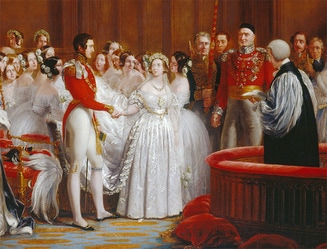
Robert Frost wrote:
Nature’s first green is gold,
Her hardest hue to hold.
Her early leaf’s a flower;
But only so an hour.
Then leaf subsides to leaf.
So Eden sank to grief,
So dawn goes down to day.
Nothing gold can stay
I especially love the line, “So dawn goes down to day.” If you’ve ever been up at sunrise you know how lovely and fresh the day seems, and then, as the sun rises fully, that sense of a new beginning is lost.
Will you allow me to write about yet another TV series? Honestly, I don’t watch TV all that much! Just the good stuff. (Especially once football season hits.) So you may have been aware that there was a series on PBS a couple of months ago about Queen Victoria. (I think I’ve mentioned it previously.) I can’t begin to tell you how masterfully it was done. They’re going to do a second season, but in the meantime you can go to this page of the Masterpiece Theater website and watch the episodes you missed.Anyway, there’s a lovely scene in which Albert and Victoria dance together and the sparks fly, finally. Everyone has been pushing for this match, as it will solve a number of succession problems. Now . . . it has happened.
And it struck me how fleeting that moment is. There they are, both young, at the very beginning of their life together, almost as if they’re enclosed in a golden circle. It’s the “first green” of their relationship. But they can’t stay there. It can’t be captured or lengthened. The dance will end. Life will progress. They’ll get married. Victoria will get pregnant–nine times. Those children will grow up. The oldest one, Bertie, the one whose birth ends the first season, will break his parents’ hearts. In fact, Victoria will end up blaming Bertie for her beloved husband’s death, since Albert’s final illness comes on after he visits Bertie at Cambridge in an attempt to get the young man to terminate an affair he’s having with a prostitute. Victoria will write of that adorable little baby boy when he’s a 19-year-old rake, “I never can or shall look at him without a shudder.” Oh dear! (Modern medical detectives think that Albert probably didn’t die of typhoid fever, the theory at the time, but of some long-standing intestinal problem such as Crohn’s disease. Victoria blamed Bertie for the death because she thought that Albert must have caught typhoid on his Cambridge trip, and even if that isn’t what happened, it’s what she thought happened.) She’ll spend the next 40 years mourning him.
You can’t ever think, ‘Oh, I want things to stay this way.’ They never do. They can’t. The adorable baby never remains an adorable baby.
Laura Vanderkam writes in her newsletter, “Just a Minute,” this week:
Time passes whether we think about how we are spending it, or not. Most of the time, we don’t think about how we are spending it. And so time flies by, or to use another image, it slips through our fingers, gone forever.
For the past two years, multiple times per day, I have paused to think about what I did with my last few hours. Now I know where the time has gone. I remember where it went. And this simple bit of mindfulness has made me feel like I have more time.
So she keeps a time log. Queen Victoria kept a diary. I’m struggling to stick with using Toggl, the time-tracking app. (So far I’ve failed to fully keep track of even one entire day, but I’m trying. It’s very instructive for me to use this tool, however imperfectly. So I just looked at the screen, and I’ve been putzing around with this post for almost an hour and a half! That’s ridiculous! I need to say what I’m going to say and get on with my life. It’s all too tempting to re-read my old posts, and spend time finding the Queen Victoria quotation about Bertie, and take a look to see if Mr. Money Mustache has written anything new, and figure out where the Laura Vanderkam post is. All of this could have been done more efficiently, but at least I know how much time I actually spent, which is helpful.)
Are you ever struck during an event by the fact that it won’t last? Does that realization make you pay more attention to the passing moments?